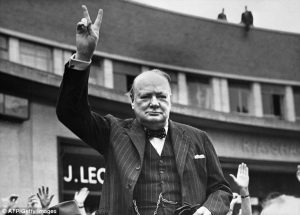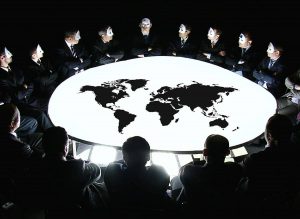Theory of Elite
Reconciliation between power holders and the idea of democracy is because of this very reason of legitimacy. In contemporary society legitimacy will be achieved through a party system. In societies where there is no party system, the position of governments becomes fragile, unconnected and even alien. This is because parties are means which enable citizens to establish a channel of communication with the authorities in order to discuss their views.
“A strong political party system has the capability, first, to expand participation through the system and thus to pre-empt or divert economic or revolutionary political activity, and, second, to moderate and channel the participation of newly mobilized groups in such manner as not to disrupt the system.”15
Since power is in the hands of a very few institutional office holders (in the United States) and both institutional and class-based office holders (in Britain), they tend to come from similar walks of life and have shared the same paths through education. Moreover, their common backgrounds are reflected in shared values – ideas of what is important – and they view the world in a similar way and seek similar solutions to problems. Democracy, in this situation, can be likened to a sporting event, all the parties are in competition to win. In order to win power they must persuade the electorate to support them rather than the other competitors. To do this they generally try to show that they are working in the national interest and for the benefit of as many diverse groups in society as possible. The electorate, according to this view, act as the adjudicator in the competition. The group which achieves the widest appeal gains the victory. However, this simple observation becomes, for politicians, a precarious balancing act: they must ꞌfeedꞌ the voters enough positive evidence that their party will be the most effective government but remain sufficiently non-committal so as to offend as few voters as possible and, at the same time, retain freedom of action should political power be won. In Schumpeterꞌs words, “Democracy is an institutional arrangement for arriving at political decisions in which individuals acquire the power to decide by means of a competitive struggle for the peopleꞌs vote.”16 The crux is ꞌthe power to decideꞌ and thus democracy is the most effective method of organising elite political rule in modern, developed society.
It also may be concluded from this work, and its relevance in a democratic as any other system, that whether one votes for Conservative Party to become the government or the Labour Party it would make no difference in respect of rule by a political elite.
Notes:
1. T.B. BOTTOMORE, Elites and Society. (London: Penguin, 1964), p.7.
2. ibid.
3. ibid.
4. ibid., p.8.
5. ibid.
6. G. MOSCA, The Ruling Class. (London: McGraw-Hill, 1939), p.50.
7. ibid.
8. ibid.
9. C.W. MILLS, The Power Elite. (New York: Oxford U.P., 1956), p.4.
10. T.B. BOTTOMORE, op. cit., p.10.
11. ibid., p.13.
12. G.Parry, Political Elites. (London: Allen & Unwin, 1969), p.53.
13. ibid., p.5.
14. A.RENWICK, Basic Political Concepts. (London: Hutchinson, 1980), p.53.
15. S.HUNTINGDON, Political Order in Changing Societies. (London: Yale U.P., 1968), p.403.
16. J.SCHUMPETER, Capitalism, Socialism and Democracy. (London: Allen & Unwin, 1947), p.269.



